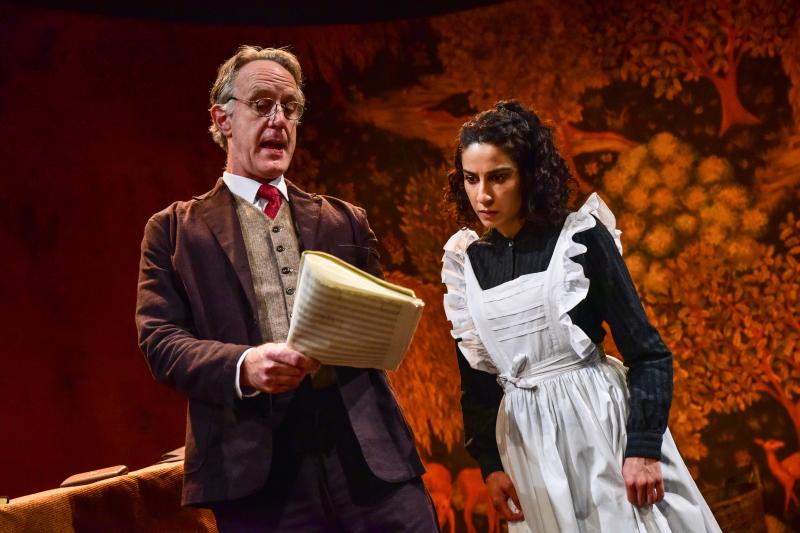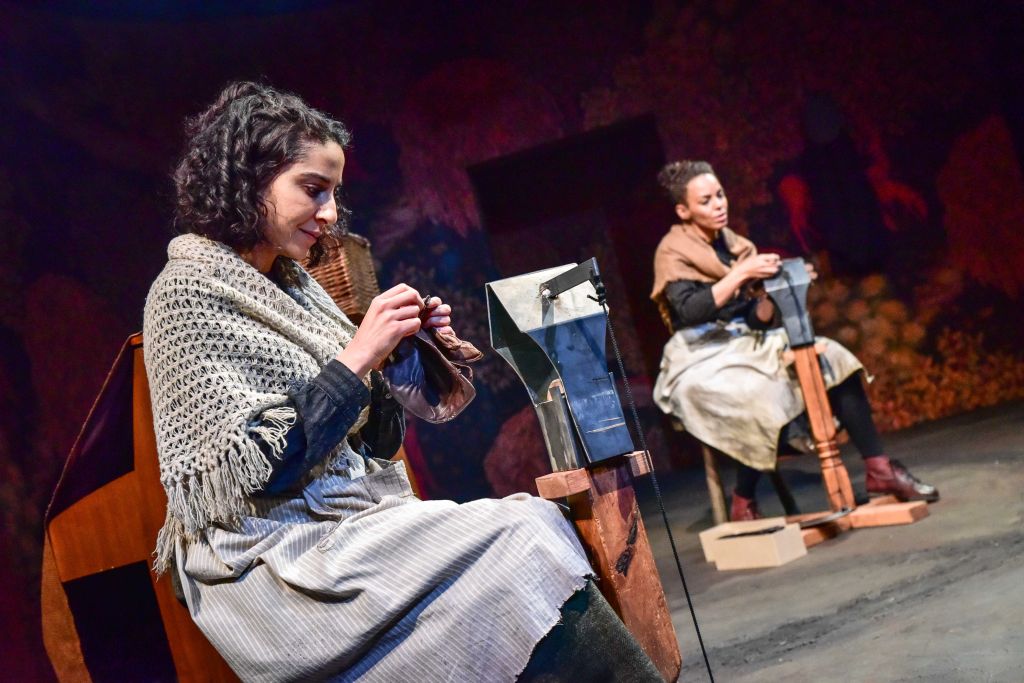Folk, Hampstead Downstairs review - thoughtful play about folklorist Cecil Sharp | reviews, news & interviews
Folk, Hampstead Downstairs review - thoughtful play about folklorist Cecil Sharp
Folk, Hampstead Downstairs review - thoughtful play about folklorist Cecil Sharp
Nell Leyshon's play-with-music asks questions of a legacy

Cecil Sharp, heritage hero or imperialist appropriator? If you attended school in the first half of the 20th century, you would have sung from his collections of English folk songs, and probably gritted your teeth and performed the country dances he recorded, too.
Or did he? Sharp’s legacy has divided academic opinion since the 1980s, attracting complaints that he was a racist (he collected Appalachian songs but none from people of colour), a sexist who ignored the output of certain groups of women, and a bourgeois who turned “folk art” into a whitewashed form that ignored the social deprivation of its performers. Leyshon wisely doesn’t target all of Sharp’s activities; his relationship with a real-life young English singer, Louie Hooper (Mariam Haque), provides her with enough material for a thoughtful play that finds its own way to skewer him.  Directed by Roxana Silbert, who runs the Hampstead, this is a studio-space piece with big ambitions. Its title, for a start, has a double resonance: as a term for the ethos of a whole nation, or as a description of its untutored art, often referred to as “naive”. Leyshon puts the two into a standoff. Which is the more important? Louie is in no doubt. Her recently deceased mother was her lodestar and the source of all she values in life, namely her songs.
Directed by Roxana Silbert, who runs the Hampstead, this is a studio-space piece with big ambitions. Its title, for a start, has a double resonance: as a term for the ethos of a whole nation, or as a description of its untutored art, often referred to as “naive”. Leyshon puts the two into a standoff. Which is the more important? Louie is in no doubt. Her recently deceased mother was her lodestar and the source of all she values in life, namely her songs.
It’s 1903 in the Levels, a low-lying, boggy part of south Somerset, where Louie and her sister Lucy (Sasha Frost, pictured above with Haque) are glovers, working by candlelight from their crude, uncarpeted home; nearby is a new glove-making factory that threatens to put them both in the poorhouse. So Louie reluctantly becomes a maid at the vicarage to supplement their income, and there she meets a visiting teacher and music researcher, Cecil Sharp (Simon Robson), who is immediately intent on setting down her songs.
The Pygmalionesque nature of this relationship is often comic. The unworldly, illiterate Louie is abrupt and blunt, though clearly sharp-witted and instinctively musical; Sharp is brisk and flowery but kindly, messianic about collecting the nation’s songs. But his mission, Leyshon suggests, is not so much scholarly as a form of cultural imperialism, driven by his desire for England to have a pure, patriotic musical identity again — the last great English composer, he tells Louie, was Henry Purcell. In her songs he finds the true sights and sounds of the nation, full of flowers, “an oak tree in a field”. As Leyshon notes in the programme, Sharp, whatever his shortcomings, tirelessly collected more than 4,000 songs.
But the crux of her play’s argument is nevertheless an aesthetic one. This isn’t a straightforward tale of a heritage thankfully preserved before the machines destroyed the lives of the labouring singers who gave birth to it. Sharp has no recording devices and only sets down lyrics and accompanying melodies. Then he subjects them to his own compositional skills, “arranging” them and writing a piano accompaniment. Listening to the made-over versions, Louie is confused: they don’t sound like her mother’s songs. No, he says, they aren’t her mother’s, they belong to the nation and have to be presented in a form this wider public finds acceptable. In a breathtaking sequence, Louie makes him go through his arrangement of “As I walked through the meadows” (one of nine Sharp-collected songs in the play), painting the scene she imagines before singing each section, in the way her mother taught her to do, and showing him exactly what his prettified version lacks.
Haque is stunning in this section, her voice soulful and dark, with just enough of the edge we have come to regard as “authentic” from the recordings that were eventually made of songs like Louie’s. It’s a standout performance all round that makes the others seem from a different theatrical planet, unfortunately, but well worth seeing in itself. The production’s musical content (musical arranger, Gary Yershon; sound design by Tingyong Dong) is particularly strong throughout.
All in all, watching Folk is an agreeable experience, but by the end you hanker for more grit, to have seen something wilder and darker, like the tones of Haque’s voice.
rating
Share this article
Add comment
The future of Arts Journalism
You can stop theartsdesk.com closing!
We urgently need financing to survive. Our fundraising drive has thus far raised £49,000 but we need to reach £100,000 or we will be forced to close. Please contribute here: https://gofund.me/c3f6033d
And if you can forward this information to anyone who might assist, we’d be grateful.

Subscribe to theartsdesk.com
Thank you for continuing to read our work on theartsdesk.com. For unlimited access to every article in its entirety, including our archive of more than 15,000 pieces, we're asking for £5 per month or £40 per year. We feel it's a very good deal, and hope you do too.
To take a subscription now simply click here.
And if you're looking for that extra gift for a friend or family member, why not treat them to a theartsdesk.com gift subscription?
more Theatre
 The Maids, Donmar Warehouse review - vibrant cast lost in a spectacular-looking fever dream
Kip Williams revises Genet, with little gained in the update except eye-popping visuals
The Maids, Donmar Warehouse review - vibrant cast lost in a spectacular-looking fever dream
Kip Williams revises Genet, with little gained in the update except eye-popping visuals
 Ragdoll, Jermyn Street Theatre review - compelling and emotionally truthful
Katherine Moar returns with a Patty Hearst-inspired follow up to her debut hit 'Farm Hall'
Ragdoll, Jermyn Street Theatre review - compelling and emotionally truthful
Katherine Moar returns with a Patty Hearst-inspired follow up to her debut hit 'Farm Hall'
 Troilus and Cressida, Globe Theatre review - a 'problem play' with added problems
Raucous and carnivalesque, but also ugly and incomprehensible
Troilus and Cressida, Globe Theatre review - a 'problem play' with added problems
Raucous and carnivalesque, but also ugly and incomprehensible
 Clarkston, Trafalgar Theatre review - two lads on a road to nowhere
Netflix star, Joe Locke, is the selling point of a production that needs one
Clarkston, Trafalgar Theatre review - two lads on a road to nowhere
Netflix star, Joe Locke, is the selling point of a production that needs one
 Ghost Stories, Peacock Theatre review - spirited staging but short on scares
Impressive spectacle saves an ageing show in an unsuitable venue
Ghost Stories, Peacock Theatre review - spirited staging but short on scares
Impressive spectacle saves an ageing show in an unsuitable venue
 Hamlet, National Theatre review - turning tragedy to comedy is no joke
Hiran Abeyeskera’s childlike prince falls flat in a mixed production
Hamlet, National Theatre review - turning tragedy to comedy is no joke
Hiran Abeyeskera’s childlike prince falls flat in a mixed production
 Rohtko, Barbican review - postmodern meditation on fake and authentic art is less than the sum of its parts
Łukasz Twarkowski's production dazzles without illuminating
Rohtko, Barbican review - postmodern meditation on fake and authentic art is less than the sum of its parts
Łukasz Twarkowski's production dazzles without illuminating
 Lee, Park Theatre review - Lee Krasner looks back on her life as an artist
Informative and interesting, the play's format limits its potential
Lee, Park Theatre review - Lee Krasner looks back on her life as an artist
Informative and interesting, the play's format limits its potential
 Measure for Measure, RSC, Stratford review - 'problem play' has no problem with relevance
Shakespeare, in this adaptation, is at his most perceptive
Measure for Measure, RSC, Stratford review - 'problem play' has no problem with relevance
Shakespeare, in this adaptation, is at his most perceptive
 The Importance of Being Earnest, Noël Coward Theatre review - dazzling and delightful queer fest
West End transfer of National Theatre hit stars Stephen Fry and Olly Alexander
The Importance of Being Earnest, Noël Coward Theatre review - dazzling and delightful queer fest
West End transfer of National Theatre hit stars Stephen Fry and Olly Alexander
 Get Down Tonight, Charing Cross Theatre review - glitz and hits from the 70s
If you love the songs of KC and the Sunshine Band, Please Do Go!
Get Down Tonight, Charing Cross Theatre review - glitz and hits from the 70s
If you love the songs of KC and the Sunshine Band, Please Do Go!
 Punch, Apollo Theatre review - powerful play about the strength of redemption
James Graham's play transfixes the audience at every stage
Punch, Apollo Theatre review - powerful play about the strength of redemption
James Graham's play transfixes the audience at every stage

Comments
I think you mean "...in the